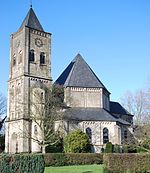Kessel, Germany
Düsseldorf region geography stubsVillages in North Rhine-Westphalia

Kessel is a village in the municipality of Goch, Kreis Kleve in the German State of North Rhine-Westphalia. The village has 2,129 inhabitants. Like Goch, Kessel is also situated at the banks of the river Niers. In addition to the central village, the townships of Nergena and Grunewald also belong to it. The western boundary of the village also forms the country-border with the Netherlands, namely the villages Ottersum and Gennep. In the northwest the Reichswald is the demarcation.
Excerpt from the Wikipedia article Kessel, Germany (License: CC BY-SA 3.0, Authors, Images).Kessel, Germany
Kranenburger Straße, Bedburg-Hau
Geographical coordinates (GPS) Address Website Nearby Places Show on map
Geographical coordinates (GPS)
| Latitude | Longitude |
|---|---|
| N 51.7075 ° | E 6.0711 ° |
Address
Gasthaus Stoffelen
Kranenburger Straße 103
47574 Bedburg-Hau
North Rhine-Westphalia, Germany
Open on Google Maps








